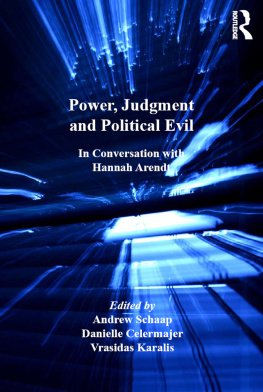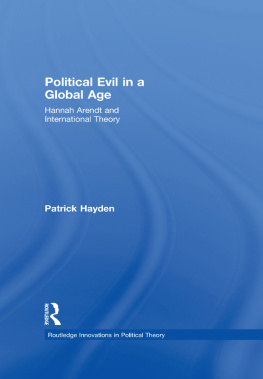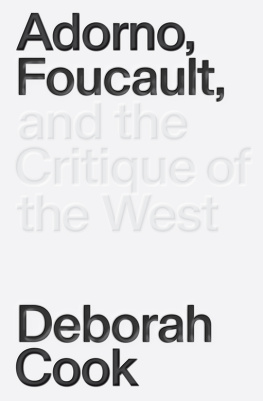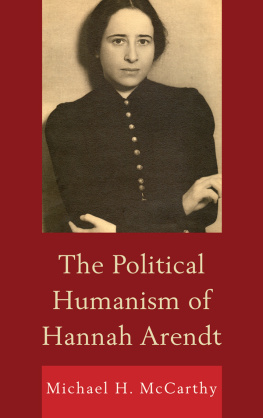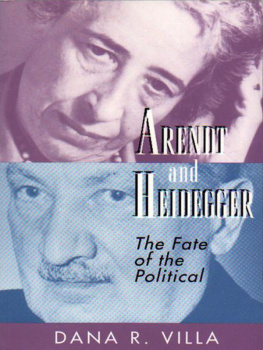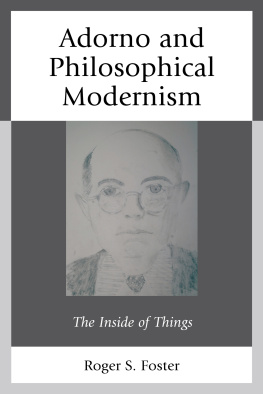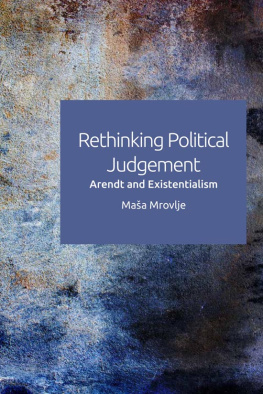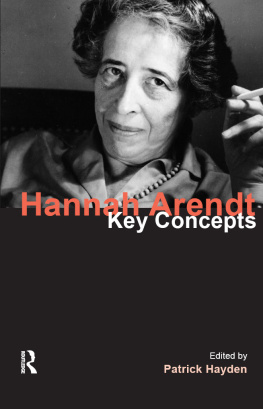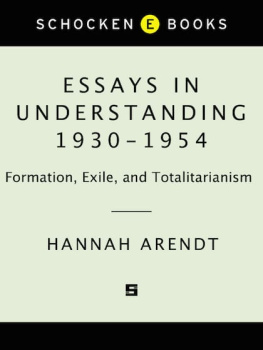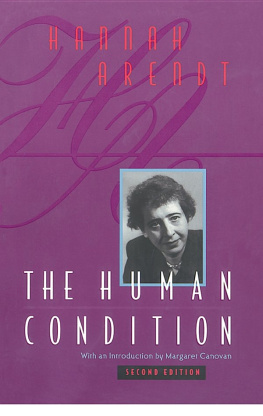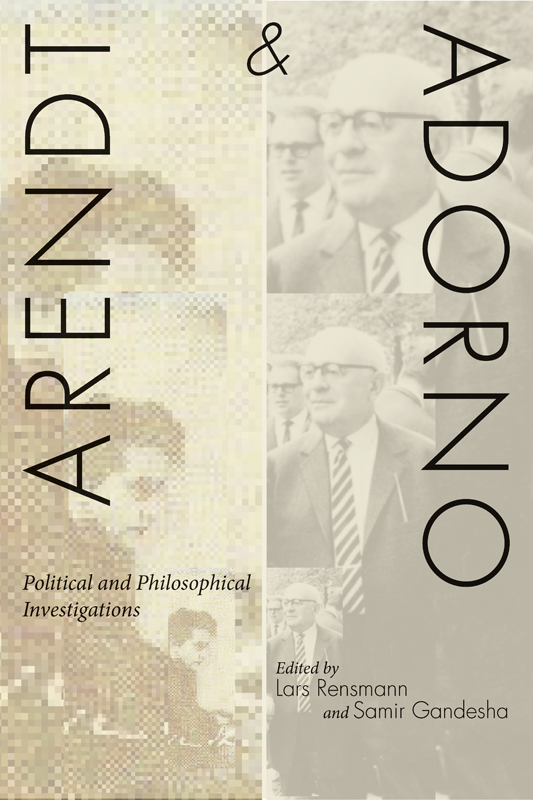Arendt and Adorno
POLITICAL AND PHILOSOPHICAL INVESTIGATIONS
EDITED BY
Lars Rensmann and Samir Gandesha
STANFORD UNIVERSITY PRESS
STANFORD, CALIFORNIA
Stanford University Press
Stanford, California
2012 by the Board of Trustees of the Leland Stanford Junior University.
All rights reserved.
No part of this book may be reproduced or transmitted in any form or by any means, electronic or mechanical, including photocopying and recording, or in any information storage or retrieval system without the prior written permission of Stanford University Press.
Printed in the United States of America on acid-free, archival-quality paper
Library of Congress Cataloging-in-Publication Data
Arendt and Adorno : political and philosophical investigations / edited by Lars Rensmann and Samir Gandesha.
pages cm
Includes bibliographical references and index.
ISBN 978-0-8047-7539-7 (cloth : alk. paper)
ISBN 978-0-8047-7540-3 (pbk : alk. paper)
ISBN 978-0-8047-8257-9 (ebook)
1. Arendt, Hannah, 19061975. 2. Adorno, Theodor W., 19031969. 3. Political sciencePhilosophy. 4. Philosophy, Modern20th century. I. Rensmann, Lars, editor of compilation. II. Gandesha, Samir (Samir Suresh), 1965editor of compilation. JC251.A74A75 2012
320.5dc23
2011037323
Contents
LARS RENSMANN AND SAMIR GANDESHA
SEYLA BENHABIB
J . M . BERNSTEIN
DANA VILLA
DIETER THOM
LARS RENSMANN
ROBERT FINE
JONATHAN JUDAKEN
JULIA SCHULZE WESSEL AND LARS RENSMANN
DIRK AUER
SAMIR GANDESHA
Preface
Hannah Arendt and Theodor Adorno were undoubtedly among the most influential political theorists and philosophers of the twentieth century. And yet despite the enormous impact the work of these two contemporaries has had on political and social theory, philosophy, and the humanities more generally, this is the first book in English that takes a comparative look at both authors. This has been a long time coming. But the book would not have seen the light of day without the cast of outstanding scholars supporting our project and contributing to this volume. We owe a special debt of gratitude to them for their willingness to present original work in this volumework cutting incisively across the rigid theoretical boundaries that have existed for far too long. We thank them, additionally, for the enormous generosity of spirit and forbearance they have shown in the face of many, often unexpected, delays. It is our hope that this volume will open the space for many more such studies that seek to compare, explore, and critically appropriate, not only Arendts and Adornos work, but also the profound intellectual traditions they embody.
This book is, in more ways than one, a collaborative project. It is a product of several years of the editors joint work on Arendt and Adorno and of many fruitful discussions between them. In no small measure, the volume has benefited hugely from the intellectual and institutional environments in which it developed, environments without which long-term commitments to projects are simply not possible. We thank Simon Fraser Universitys Institute for the Humanities, which is approaching its thirtieth year, and the University of Michigan, in particular its Department of Political Science, for funding and institutional support, and for providing the kind of extraordinary spaces and communities in which our work could take hold and flourish.
We are also very grateful to graduate students at both institutions for their feedback in seminars on Hannah Arendt and on the Frankfurt School. The German Academic Exchange Service (DAAD), which generously co-funds Rensmanns position at the University of Michigan, has supported the production of this book in countless ways; so has the Moses Mendelssohn Center at the University of Potsdam, where he is a Permanent Fellow. The generous support of the Alexander Humboldt Foundation, which made possible Gandeshas extended stay in Germany in 20012 , has also played a critical role in making this project possible, as has the Social Sciences and Humanities Research Council of Canada. The authors are also grateful for support from the Simon Fraser University Publications Committee.
To a considerable extent, the book owes its existence to the support and encouragement of wonderful colleagues and friends, many of them at our respective universities, who shared their ideas, pushed us to think in new directions, read all or some of the chapters and were crucial in helping us finish the book. They can take credit for whatever merits this book may possess but not the responsibility for any of its shortcomings, which are ours alone. Special thanks are owed to Ian Angus, Seyla Benhabib, Stephen Eric Bronner, Lisa Disch, Andrew Feenberg, Malachi Haim Hacohen, Donald Herzog, Martin Jay, Jennet Kirkpatrick, Mika LaVaque-Manty, Anne Manuel, Andrei S. Markovits, Christoph Menke, Douglas Moggach, Charles Reeve, Mark Rigstad, Arlene Saxonhouse, Elizabeth Wingrove, Richard Wolin, Jerry Zaslove, and Mariah Zeisberg. We are particularly grateful to our acquisitions editor at Stanford University Press, Emily-Jane Cohen, for her unwavering and relentlessly energetic support at every step of the way and her extraordinary work with us over the years, and to assistant editor Sarah Crane Newman, whose careful and diligent work made everything easier. We owe special thanks to Peter Dreyer for meticulous copy editing, and to production editor Tim Roberts. Its really hard to overstate the role they had in making this book happen. We are sure that in this difficult climate for academic publishing, our experience is far from typical.
We would like to thank a number of graduate students who helped in countless ways on this project, among them Andrew Bingham, Adela Muchova, Dennis Nattkemper, and Natalie Wing. We also thank Thomas Murphey for his insightful comments, and we owe special thanks to Suzanne Hawkins, who was instrumental to helping us bring the manuscript together at the end, and who contributed most of the index.
Last but not least, we owe gratitude to our respective families, whose presence and support mean the world to us, Rachia van Lierop, Ruby and Milan Gandesha, and Ina and Samira Klingenberg. We could not have done it without them.
Contributors
DIRK AUER is a freelance journalist and sociologist with Balkanbiro in Sofia, Bulgaria, and a former lecturer in the Department of Sociology and Institute for Sociology and Social Research, University of Oldenburg, Germany. His publications include Politisierte Demokratie: Richard Rortys politischer Antiessentialismus (Wiesbaden: VS Verlag fr Sozialwissenschaften, 2004 ), Die Gesellschaftstheorie Adornos, with Thorsten Bonacker and Stefan Mller Doohm (Darmstadt: Primus, 1998 ), and Arendt und Adorno, edited with Lars Rensmann and Julia Schulze Wessel (Frankfurt: Suhrkamp, 2003 ).
SEYLA BENHABIB is Eugene Meyer Professor of Political Science and Philosophy at Yale University and a former president of the Eastern Division of the American Philosophical Association. Her many books on political theory and philosophy include Critique, Norm and Utopia: A Study of the Foundations of Critical Theory (New York: Columbia University Press, 1986 ), The Reluctant Modernism of Hannah Arendt (Lanham, MD: Rowman & Littlefield, 2003 ), The Rights of Others: Aliens, Citizens and Residents (New York: Cambridge University Press, 2004 ), winner of the Ralph Bunche Award of the American Political Science Association, and Another Cosmopolitanism (New York: Oxford University Press 2006 ). She is also the author of dozens of scholarly articles and the editor of many books, including most recently


